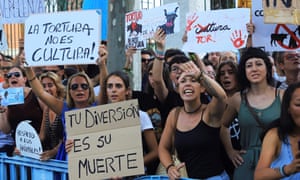How the far right in Spain has seized on A ‘sport’ that went out of fashion after Franco is the axis of a new cultural battle as nationalism seeks to re-establish itself
Last Friday, after a brief prohibition, bullfighting returned to Mallorca. The bullfight was well attended and it was met with a demonstration by a large group of animal rights protesters. To drown out the demonstrators, Cara al Sol (Facing the Sun) – the anthem of the Spanish fascist party, the Falange – was played over the loudspeakers. What exactly is going on here?
The cult of the bull on the Iberian peninsula goes back millennia, but bullfights are a more recent phenomenon. They date to the 18th century when Felipe V, the first of the Bourbon kings, banned and disparaged bullfighting by the aristocracy. Old-style bullfighting – nobles on horseback fighting bulls with lances – died out, giving rise to a new type of bullfighting, on foot and practised by the common people.
This bullfighting had already taken form by the beginning of the 19th century when the Napoleonic invasion gave rise to Spanish nationalism. During the 1830s bulls became a metaphor for nationalism during the civil war between the absolutist Carlists and the liberals. Bullfights, now newly signifying liberalism, expanded throughout Spain.
This was the case in Barcelona: in the 20th century there were three bullrings in the city – an indication of bullfighting’s popularity, even among Catalanist republicans. This popularity came to an end with the Franco regime under which bullfights came to be a metaphor for a supposed race, a homogenous nation and an identity that was misunderstood in Europe.
The political colonisation of a popular pursuit led to the gradual distancing of the public from bullfighting – as people also distanced themselves from Francoism and Spanish nationalism. The Catalan parliament passed laws to protect animal rights and in 2011 banned any spectacle involving cruelty. That spelled the end of bullfighting in Catalonia – there are now no bullrings in Barcelona.
For nationalist reasons rather than to protect animals, the same law that banned bullfighting, seen as a definitively Spanish pursuit, permitted Catalan bull festivals such as the “bulls of fire”, a “sport” involving bulls with flaming material fixed to their horns – although the practice is cruel too.
In 2013 the constitutional court declared the Catalan ban an unconstitutional prohibition of “Spanish cultural heritage”. The same thing happened in Mallorca, only faster. In 2017, Catalan-speaking Mallorca banned spectacles that involve brutalising animals. In 2018 the ban was declared unconstitutional and last week the tradition resumed and was united with another: playing of the Cara al Sol.
The manner in which the bullfighting tradition was repositioned in Mallorca, along with its soundtrack, represents a sudden change. Bullfighting has become the axis of a new cultural battle between peninsular nationalisms. When the coalition government was established in Andalucía earlier this year, bringing together the conventional rightwing Popular and Citizens parties with Vox, a party in the same orbit as France’s Rassemblement National, there were four core issues: bullfighting, hunting, ending measures against gender violence and those regarding historical memory – in effect, against any moral reparations for the losers in the civil war.
The new Madrid regional government, comprised of the same three parties, has also alluded to these issues, as well as bringing in pro-bullfighting measures, which is odd, because bullfighting isn’t under any threat in Madrid or Andalucía. This is an indication that what is occurring here is an underlying cultural battle and, by extension, the reformulation of Spanish nationalism.
The idea is that there are Spanish people who love tradition, bullfighting and hunting, who have had to give a lot of ground since the death of Franco in 1975, and who wish to revive their supposedly threatened traditions. A speech delivered in October 2017 by King Felipe VI – descendent of Felipe V who, unknowingly, created the 18th-century bullfight – in which he alluded to the Catalan crisis by stating that Spain is a finished state in no need of reform, is closely related to this idea of returning to a better past.
The Popular and Citizens parties, as well as Vox, talk about this a lot in their electoral meetings and about what they claim are attacks on individual liberty and on national values such as bullfighting, hunting, the Spanish language and the family. These values can also include a vindication of victory in the civil war – and Cara al Sol. To encompass all of this, sometimes all it takes is a bull.
Translated from Spanish by Stephen Burgen
•Guillem Martínez is a journalist and writer. He has published books on Spanish culture and politics, as well as on the Catalan sovereignty process

No comments:
Post a Comment